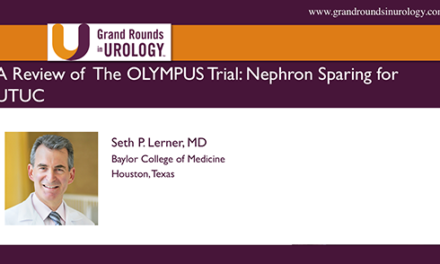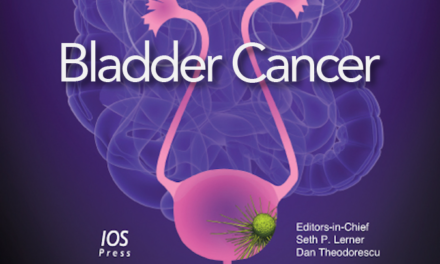Donna E. Hansel, MD, PhD, presented “What Should I Do About Micropapillae? Do I Treat it Differently than Standard?” at the 6th International Bladder Cancer Update on November 20, 2022, in Scottsdale, Arizona.
This content is available free to the GRU Community. Login or create an account to view it.
How to cite: Hansel, Donna E. “What Should I Do About Micropapillae? Do I Treat it Differently than Standard?” November 2022. Accessed Oct 2025. https://grandroundsinurology.com/what-should-i-do-about-micropapillae-do-i-treat-it-differently-than-standard/
What Should I Do About Micropapillae? Do I Treat it Differently than Standard? – Summary
Donna E. Hansel, MD, PhD, identifies the histopathological features that set micropapillary bladder cancer apart. This variant, though relatively rare, poses significant challenges due to its aggressive behavior and distinct morphological traits. She explains that micropapillary bladder cancer often exhibits a propensity for early invasion into the muscularis propria and a higher likelihood of lymphovascular invasion, factors that contribute to its aggressive clinical course.
Given these characteristics, Dr. Hansel underscores the necessity of a more vigilant and aggressive treatment strategy compared to standard urothelial carcinoma. She discusses the pivotal role of accurate staging and early detection, advocating for comprehensive diagnostic evaluations including advanced imaging techniques and cystoscopy. Her presentation highlights the critical importance of recognizing micropapillary features in biopsy specimens to guide appropriate therapeutic decisions.
Treatment paradigms for micropapillary bladder cancer, as outlined by Dr. Hansel, diverge significantly from those for standard bladder cancer. She emphasizes that immediate radical cystectomy often emerges as the preferred treatment modality due to the high risk of progression and metastasis associated with micropapillary histology. Dr. Hansel provides compelling evidence from recent studies that support this aggressive surgical approach, aiming to improve patient outcomes.
In addition to surgical intervention, Dr. Hansel explores the potential benefits of neoadjuvant chemotherapy, stressing its role in downstaging the tumor and addressing micrometastatic disease. She also considers the prospects of adjuvant therapies post-cystectomy, particularly in high-risk patients, to mitigate recurrence rates and enhance long-term survival.
About the 6th International Bladder Cancer Update:
The International Bladder Cancer Update (IBCU) is a CME conference focused on the diagnosis and treatment of bladder cancer. The conference offers medical professionals an opportunity to listen to updates from, and interact with, expert international faculty to improve knowledge and determine best treatment practices to improve patient outcomes. IBCU encompasses expert lectures, interactive discussions, a panel roundtable, debates, and case presentations. It is physician-led, multi-supported, and designed for urologists, urologic oncologists, and other healthcare professionals involved in the treatment of bladder cancer.
For further educational activities from this conference, visit our collection page.
ABOUT THE AUTHOR
Donna E. Hansel, MD, PhD, is the Division Head of Pathology and Laboratory Medicine at the University of Texas MD Anderson Cancer Center in Houston, Texas. Previously, Dr. Hansel served as the Chair of Pathology at Oregon Health & Science University (OHSU) in Portland, Oregon. In 2013, Dr. Hansel was appointed Professor of Pathology and Chief of the Division of Anatomic Pathology at the University of California, San Diego. Dr. Hansel joined the Cleveland Clinic Anatomic Pathology Staff as Assistant Professor in 2006 as a subspecialty genitourinary pathologist and was promoted to Associate Professor in 2010.
Dr. Hansel completed a bachelor of science degree in biology at Johns Hopkins University, graduating Phi Beta Kappa. She subsequently completed the MD-PhD Medical Scientist Training Program, pathology residency, and urologic pathology fellowship at the Johns Hopkins University School of Medicine.
Dr. Hansel has authored over 170 peer-reviewed publications, edited or authored five textbooks on urologic pathology and biospecimen repositories, and participated in more than 100 national or international talks on bladder cancer. She has participated in the kidney-urinary tract panel for the 8th Edition Cancer Staging Manual of the American Joint Committee on Cancer (AJCC) and contributed to the 5th edition of the WHO Classification of Tumours of the Urinary System and Male Genital Organs. In addition, Dr. Hansel is on the editorial board of the American Journal of Surgical Pathology, Advances in Anatomic Pathology, American Journal of Pathology, Histopathology, and Archives of Pathology & Laboratory Medicine where she serves as Deputy Executive Editor. Dr. Hansel has mentored over 40 residents, graduate students, and postdoctoral fellows while remaining active in clinical science and overseeing a research laboratory focused on invasive cancer mechanisms.




